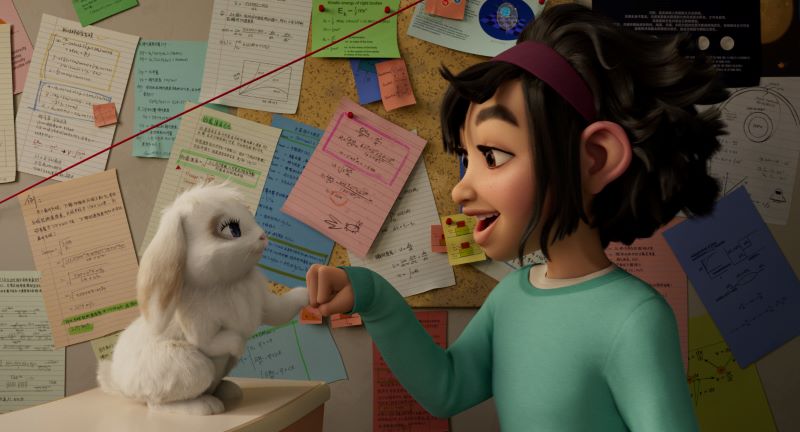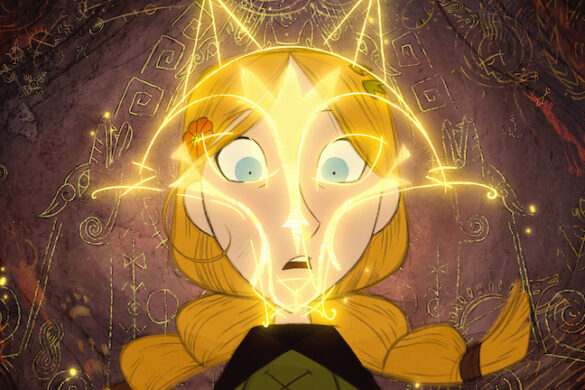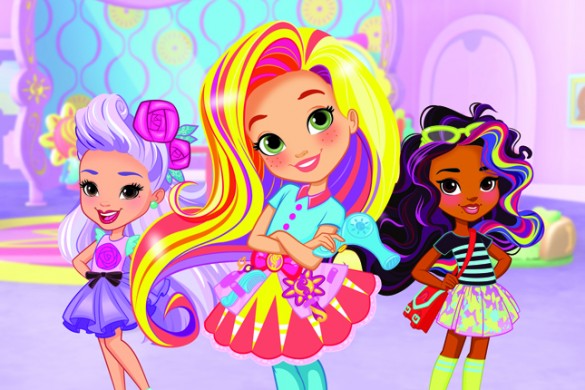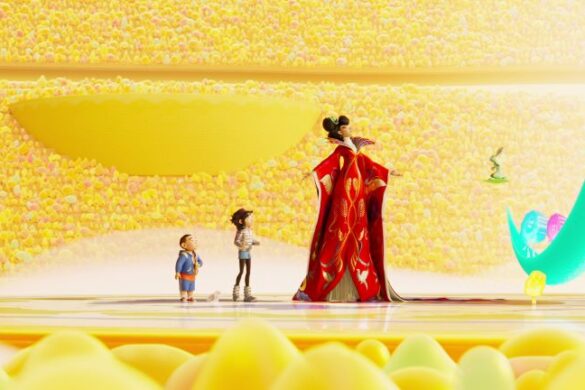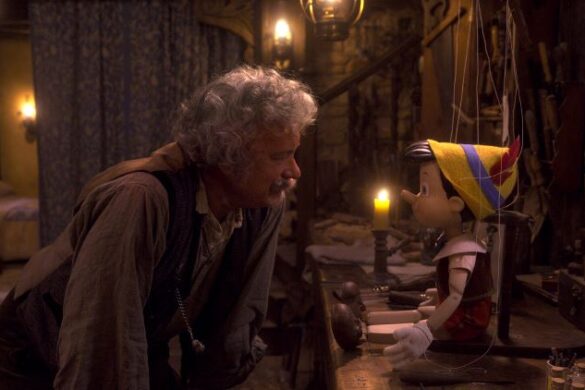There are very few films that can address grief and the emotional pains of loss with such grace and tenderness, but Netflix’s ‘Over the Moon’ accomplished that, and more. The animated musical’s pathos reminds us of the sorrow that families share during a tragedy and how family bonds help us cope during those difficult times. Backed by some bubbly EDM music as well respectful nods to the Chinese culture, and delightfully entertaining lessons in science and math, Over the Moon reaches for the stars in colorful ways while bringing us down to Earth with its resonating story.
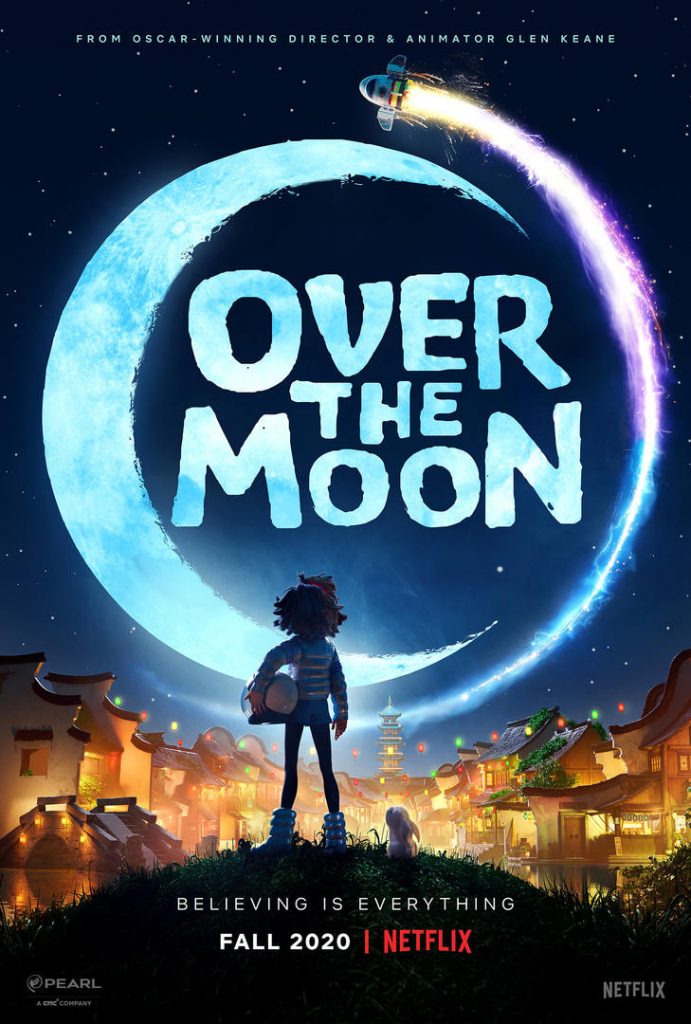
And though ‘Over the Moon’s all-Asian voice cast should be celebrated for continuing to push for more Asian representation, some of the casting choices are questionable considering that the film has some of its Chinese characters voiced by other Asian ethnicities.
‘Over the Moon’ centers around the story of Fei Fei (Cathy Ang), a determined young girl who builds a rocket ship to prove to her family that the moon goddess Chung’e is more than a legend. She wants to prove that she is real. But this quest has some unexpected twists that turn this adventure into a colorful musical journey of finding the strength to move forward, embracing change, and the power of imagination.
The film takes its “Believing is Everything” tag to heart. For FeiFei she hangs onto every one of her mother’s (Ruth Ann Miles) words, especially when she tells the story of about the mythological Chung-e (Phillipa Soo). According to legend, a giant space dog would take a bit out of the moon, before he can eat all of it, Chung’e would make the space dog spit everything he bit. And that is why there are moon phases.
While it may be a silly legend, there is tragedy tied to Chung’e’s story. After the moon goddess drinks an immortality potion, she is separated from her true love Houyi (Conrad Ricamora) and banished to live on the moon. Trapped, she awaits the day that her trusty jade rabbit will concoct a new potion that would reunite her with her true love. It’s a story that means a lot to FeiFei, as she sees her parents’ love as the living embodiment of Chung’e and Houyi’s story.
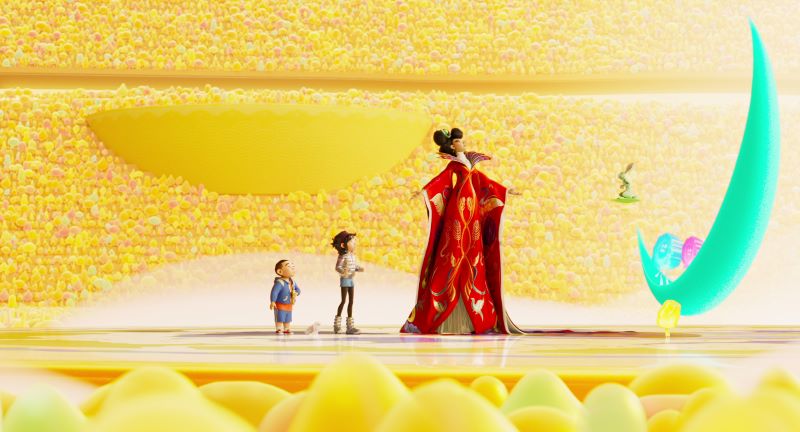
But the happy family is left broken after Fei Fei’s mother’s declining health reaches a tragic end. Though she and her father always could rely on each other, the family dynamics shift dramatically when Fei Fei’s (John Cho) father tells her that Ms. Zhong (Sandra Oh) and her eight-year-old son Chin (Robert G. Chu) would be a part of their new family. Despite their warmth and kind disposition, Fei Fei objects this new relationship. For her, they are intruding on their family traditions. Especially when Ms. Zhong tries to put red dates in moon cakes, an ingredient that Fei Fei’s mother would never use.
Frustrated that her father seems to be moving on, Fei Fei wishes things could go back to the way things were. She believes that if her father could remember the story of Chung’e, he would never marry Ms. Zhong. That’s she is inspired to build a rocket that would take her to the moon, where she would prove to her father that Chung’ e exists.
Using her love of math and science, Fei Fei successfully builds a rocketship that would take her to the lunar rock above the sky. But her journey has some unexpected problems when Chin stows away. Having not calculated for the extra weight, the two crash land on the moon., which is barren and desolate. Despite some of those setbacks, Fei Fei finds Chung’e. But she is surprised that she isn’t like the elegant and graceful moon goddess her mother told her. Instead, Chui is an extraordinary EDM pop star singing songs about being Ultraluminary at her concerts for the sentient mooncakes and Lunarians, amniotic lunar lifeforms.
Fei Fei is ecstatic to find out that Chung’e is real. Though she successfully takes a photo with the moon goddess, it does come with a price. In order to bring that photo home, Fei Fei must find “the gift” for Chung’e, who believes will help her reunite with her true love. With no idea what the gift is or where to look, FeiFei comes to find out who her real friends and family are and that the sadness that comes with losing a loved one is a part of grief.
Grief and loss are messages that are not easy to convey in any film, as everyone’s experience coping is different. But director Glen Keane tells it in such a delicate way that feels honest, but also whimsy. His experience as a Disney legend and visualizing profoundly personal stories were the keys needed to turn a modern-day tale that is extrapolated from the mythology of Chung’e, the Chinese moon goddess, into something that will resonate with its audience.
Though the story may be a bit formulaic, Audrey Wells’ script is more of a love letter to those struggling with grief and learning to find the strength to move on to the next phase of their lives. Sadly, ‘Over the Moon’ was Wells’ final script before her passing. In a way, that kind of insight allowed Wells to craft a more authentic story because we are seeing her farewell to her family in these characters. Tying that to the myth of Chung’e only adds a cultural layer that gives the film more depth.
Much of the film’s emotional core is rooted in both the profoundly emotional story and Chinese culture. And a lot of that comes through the art, music, and literature. It’s also seen in smaller instances like Fei Fei tapping on stone lions, the family gathering together at a round table, or when Fei Fei spends long nights studying at her desk while also drinking boba and eating noodles out of a cup.
It’s almost hard not to find the details that would resonate with anyone who is Asian. That is especially true in family dynamics. The warm and happy environment created when the family gathers for dinner at a round table, or when the adults play mahjong. It’s something that I can appreciate watching because it’s something that I experienced.
In between all of that are a collection of songs that are a mixture of catchy and heartfelt. Songs about moon cakes hit on culture, family tradition, and how moon cakes are more than just moon cakes. “Rocket to the Moon” minds us about the power of optimism and imagination, while “Ultraluminary” is a high energy pop song that is well-suited for dancing.
The film’s way lunar setting and bright colors may be a bit over the top, but it grounds itself through its characters trying to process their grief and loss. Attempting to deliver such a message requires a deft hand, and Keane directs that beautifully. It tells them that it is okay to move on because you cannot let the grief consume you.
‘Over the Moon’ also shines a light encouraging female empowerment and the power of science, technology, engineering, and math. Fei Fei’s is knowledgable when it comes to STEM. So much so that impresses some of the engineers building a new high-speed rail system. It becomes even more inspiring when she starts to tie in math and science into the “Rocket to the Moon song.” Math formulas come alive and seemingly dance around Fei Fei, who sings about how F is for force and G is for Gravity. It’s certainly more fun to learn about these scientific laws through this than some teacher droning on from a textbook.
While ‘Over the Moon’s all Asian cast is a celebration of Asian representation, I feel somewhat conflicted about it because of the story’s specificities. The film draws from Chinese culture and occasionally uses the Mandarin dialect. Though that opens the door to a culture for those who may not be familiar with it, the voices don’t necessarily match the the characters. Fei Fei’sfather is voiced by John Cho, a Korean. Ms. Zhong is voiced by Sandra Oh, also a Korean. Though they are great actors of color in their own right, I couldn’t help but think that the film does treat Asians as a monolith. Of course, I believe that this was not done intentionally. It could be the case that the film needed some major star power in order to draw a big audience. And it doesn’t get any bigger than Cho or Oh. This also isn’t to dimmish their efforts as them being involved also helps with Asian representation. I just wish that there was more consideration put into the casting effort.
If anything, we have to remember that ‘Over the Moon’ tells a universal story that is from a unique cultural perspective. It was nice to see some of those nuances in its tiny gestures or big musical numbers. The obvious westernized version of Chung’e being a pop star may be a puzzling choice to those who grew up with those stories; it introduces the moon goddess myth to an audience in a way that connects to them. So while it may not be the Chung’e that we are familiar with, its a Chung’e that’s for the audience of a new age.
Over The Moon streams exclusively on Netflix October 23.

